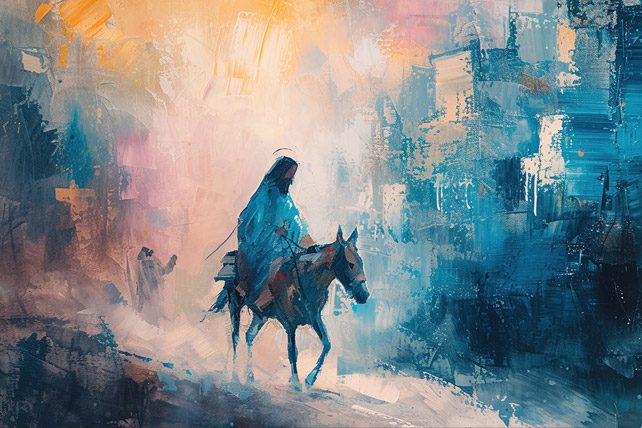We are coming up on Holy Week, which traditionally begins with Palm Sunday, marking the entry of Jesus into Jerusalem. It’s a seemingly tame, innocuous day filled with symbolism but little significance. It would be easy to think of it as an event distant from the day’s headlines and debates.
Think again.
It was already a day destined to be filled with explosive potential. One reason is because it was the first time that Jesus had visited Jerusalem since He began his public ministry. Even those who weren’t sure about who Jesus was knew that this would be something of significance. Here was a man who was working miracles, raising the dead, giving radical teachings causing thousands to follow. People were hoping, calling, for him to lead the entire nation, to declare independence from Rome, and to set up a new dynasty. And now he was coming to the most holy of cities, the place of the great Temple and the heart of the Jewish faith, as well as the heart of the Jewish people. If he was going to do anything, lead anything, declare himself to be anything, be crowned anything, it would be here.
Those closest to Jesus shared the expectation. He had been telling them all along that everything he was doing, everything He was teaching, everything he was about, was moving toward Jerusalem. Even entering on a colt, in fulfillment of the prophet Zechariah’s declaration surrounding the coming Messiah, made the import of the day clear.
But about that colt….
The donkey was a lowly animal, an animal of peace. Not of conquest. If Jesus had wanted to be a king of conquest, of war, of establishing a kingdom on earth, he would have never entered Jerusalem on a donkey. He would have ridden in on a war-horse. But he very purposefully did not.
It all seemed orchestrated to be in direct opposition to the desires of the people. We are told they laid down blankets and branches in front of him, which is why the day he entered Jerusalem is often called Palm Sunday. It was meant as more than mere honor. Palm branches represented Jewish nationalism, Jewish pride, Jewish victory. Coins that were minted during that time would have pictures of palms on them because they were understood to represent nationalism in general. So a palm on a Jewish coin signified Jewish nationalism; a palm on a Roman coin signified Roman nationalism. By spreading out palms in front of Jesus, they were welcoming him, inviting him, wanting him to become their political and military liberator. The one who would restore Jerusalem to her greatness.
They didn’t convey that hope simply through palm branches. They famously met his arrival with “Hosanna!”—a Hebrew expression that meant “Save us!” or “Save now!” This was followed by shouts about the restoration of the kingdom of David.
It made sense. Jesus had healed people, fed people, even raised people from the dead. That was power! And power was what they wanted. Power to defeat the Romans and make Jerusalem great again.
But they didn’t pay attention to what he was riding. The triumphal entry they gave him wasn’t the one He was making. He wasn’t there for Jerusalem or any other nation. He was there to triumph over sin. He was there to bring salvation. He was there to sacrifice himself on a cross.
There were two kingdoms in play that day. There was the kingdom of men—of nations and power and politics and economies—and the Kingdom of God, which was about souls and spirits, sin and forgiveness, peace and justice.

